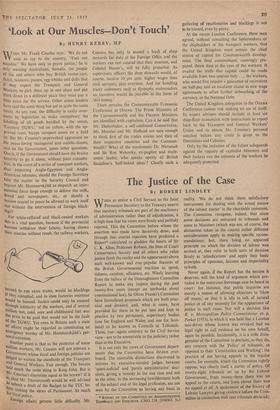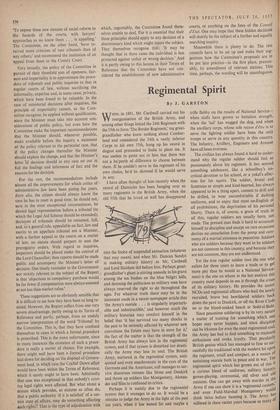The Justice of the Case
By ROBERT LINDLEY
WHEN as senior a Civil Servant as the Joint Permanent Secretary to the Treasury asserts that statutory tribunals are part of the machinery of administration rather than of adjudication, it is high time that his views were firmly and publi*ly rejected. This the Committee before whom the assertion was made have decisively done; and through that crucial rejection have produced a Report* calculated to gladden the hearts of Sir C. K. Allen, Professor Robson, the Inns of Court Conservative Society and all others who value justice (both the reality and the appearance) above such well-known and ever-popular features of the British Governmental machine as speed, tidiness, candour, efficiency, etc. Wisely learning from the failure of the Donoughmore Committee Report to make any impact during the past twenty-five years (except on textbooks about constitutional law), Sir Oliver Franks's Committee have formulated proposals which are both prac- tical and detailed, and, what is more, have provided for them to be put into and kept in practice by two permanent, supervisory bodies (one for England and Wales, and one for Scot- land) to be known as Councils or Tribunals. These, too—again contrary to the Civil Service view—are to be answerable to the judiciary rather than to the Executive.
It is not only the views of Government depart- ments that the Committee have thrown over- board. The miserable distinctions discovered in statutes by executive-minded judges between 'quasi-judicial' and 'purely administrative' deci- sions, giving a remedy in the one case and not in the other, to the increasing bewilderment both of the subject and of the legal profession, are not seen by the Committee as having any basis in * REPORT OF THE COMMITTEE ON ADMINISTRATIVE TRIBUNALS AND ENQUIRIES, CMO 218. (HMSO, 58.) reality. 'We do not think them satisfactory instruments for dealing with the actual nature of the subject matter' is the charitable comment. The Committee recognise, indeed, that since some decisions are entrusted to tribunals and some to Ministers (which was not, of course, the distinction taken in the courts) rather different considerations apply in making. specific recom- mendations; but, there being no apparent principle on which the division of labour was arrived at, they refer to both sorts of decision firmly as 'adjudications' and apply their basic principles of openness, fairness and impartiality to both.
Never again, if the Report has the success it deserves, will the kind of argument which pre- vailed in the notorious Stevenage case be heard in court : for instance, that public inquiries are merely a means of allowing objectors to 'blow off steam,' or that it is idle to talk of natural justice or of any necessity for the appearance of justice in such cases. Nor will a decision like R. v. Metropolitan Police Commissioner ex p. Parker (1953), in which it was held that a London taxi-driver whose licence was revoked had no legal right to call evidence on his own behalf, again be possible. Incidentally, it is a trifle disin- genuous of the Committee to disclaim, as they do, any concern with the 'Policy' of tribunals, as opposed to their 'Constitution and Working'; the practice of not having appeals to the regular courts, for example, which the Committee rightly oppose, was clearly itself a matter of policy. Of twenty-eight tribunals set up by the Labour Government, from twenty-three there was no appeal to the courts, and from eleven there was no appeal at all. A spokesman of the Society of Labour Lawyers giving evidence before the Com- mittee in connection with rent tribunals declared: 'To expose these new statutes of social reform to the hazards of the courts, with lawyers' approaches as we know them . . . is appalling.' The Committee, on the other hand, 'have re- ceived more criticism of rent tribunals than of any others,' and recommend the institution of an appeal from them to the County Court.
Very broadly, the policy of the Committee in pursuit of their threefold aim of openness, fair- ness and impartiality is to approximate the proce- dure of tribunals and public inquiries to that in regular courts of law, without sacrificing the informality, expertise and, in some cases, privacy, which have been found to be valuable. In the case of ministerial decisions after inquiries, the principle of impartiality cannot, as the Com- mittee recognise, be applied without qualification, since the Minister must take into account con- siderations of public policy, but even here the Committee make the important recommendations that the Minister should, whenever possible, make available before the inquiry a statement of the policy relevant to the particular case, that if the policy changes thereafter the Minister should explain the change, and that the Minister's letter of decision should in any case set out in full the findings and inferences of fact and the reasons for the decision.
For the rest, the recommendations include almost all the improvements for which critics of administrative law have been pining for years. Inter alia, the citizen should always know the case he has to meet in good time; he should not, save in the most exceptional circumstances, be denied legal representation before a tribunal (to which the Legal Aid Scheme should be extended); decisions of tribunals should be reasoned, full, and, as a general rule, appealable on fact, law and merits to an appellate tribunal not a Minister, with a further appeal to the courts on a matter of law; no statute should purport to oust the prerogative orders. With regard to inquiries, inspectors should be placed under the control of the Lord Chancellor; then reports should be made public and accompany the Minister's letter of decision. One timely reminder to the Government not strictly relevant to the subject of the Report is that 'objections to compulsory purchase would be far fewer if compensation were always assessed at not less than market value.'
These suggestions are so obviously sensible that it is difficult to see how they have been so long re- sisted. However, the Report suffers from one very severe disadvantage, partly owing to its Terms of Reference and partly, perhaps, from an unduly narrow interpretation of the word 'Tribunal' by the Committee. This is, that they have confined themselves to cases in which a formal procedure is prescribed. This is the more unfortunate, since in many instances the existence of such a proce- dure is really a matter of chance. For example, there might well have been a formal procedure laid down for deciding on the disposal of Govern- ment land, in which case the Crichel Down affair would have been within the Terms of Reference, which it surely ought to have been. Admittedly that case was exceptional in that nobody's exist- ing legal rights were affected. But what about a statute which provides, as statutes so often do, that a public authority 'if it is satisfied' of a cer- tain state of affairs, may do something affecting such rights? That is the type of adjudication with which, regrettably, the Committee found them- selves unable to deal. For it is essential that their three principles should apply to any decision of a discretionary kind which might injure the subject. They themselves recognise this: 'It may be thought that in these cases the individual is less protected against unfair or wrong decision.' And it is partly owing to this lacuna in their Terms of Reference that the Committee have not con- sidered the establishment of new administrative courts, or anything on the lines of the Conseil d'Etat. One may hope that these hidden decisions will shortly be the subject of a further and equally searching inquiry.
Meanwhile there is plenty to do. The two councils have to be set up and make their sug- gestions how the Committee's proposals are to be put into practice—in the first place, presum- ably, by amendment of relevant statutes. This time, perhaps, the wording will be unambiguous.































 Previous page
Previous page